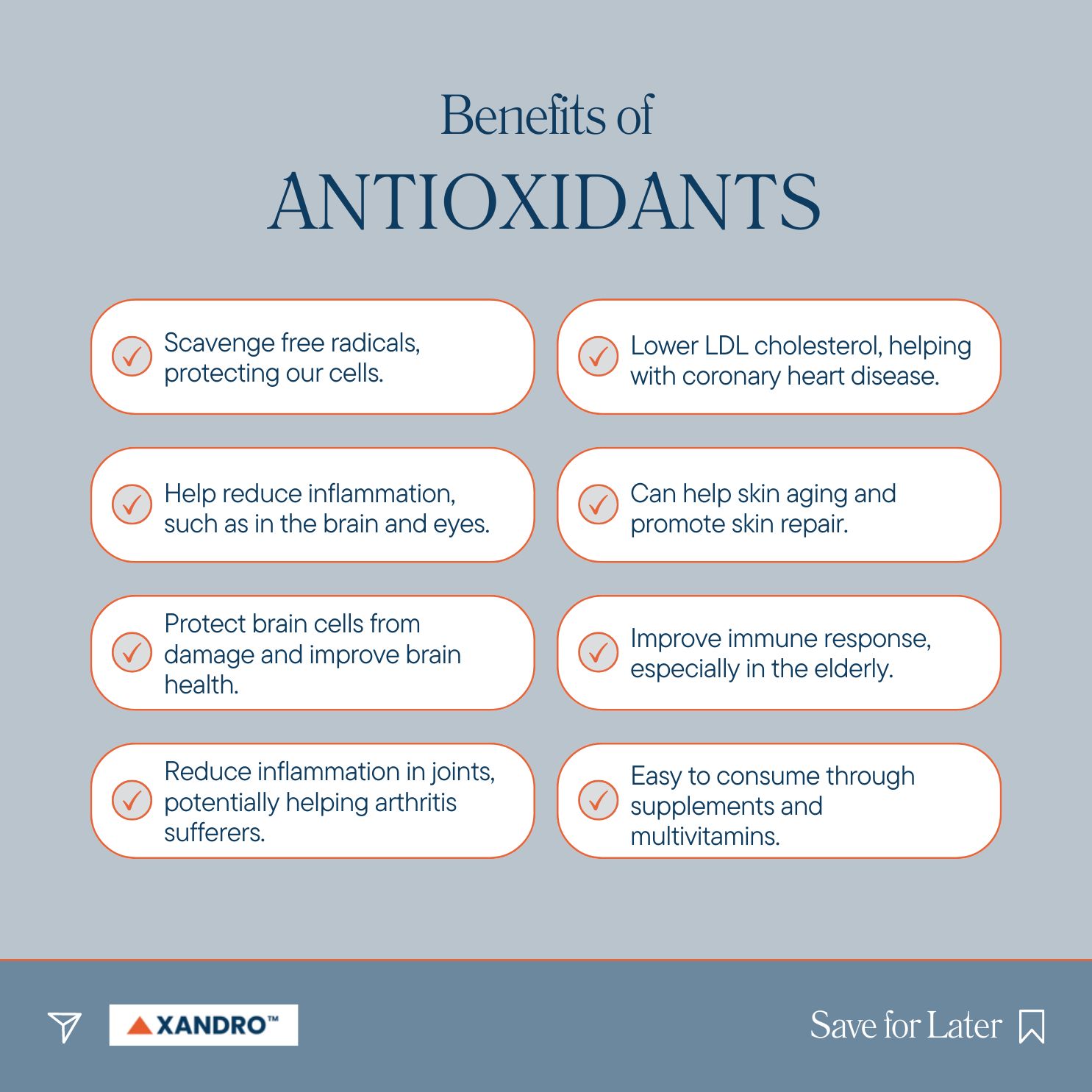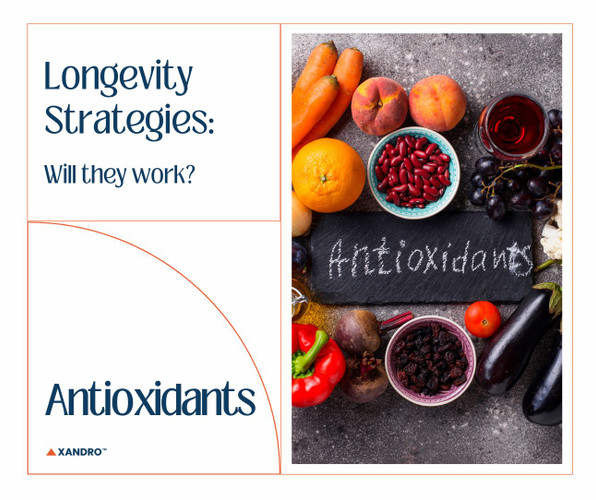Do Antioxidants Actually Extend Lifespan?
14th Jun 2024
Popular Influencer Longevity Regime: Antioxidants
Now onto the last of our ‘5 ways to live longer’ articles: longevity experts edition. This post is about antioxidants supplements,
We cover what antioxidants are, antioxidants foods, antioxidants benefits as well as other longevity tips to help improve your health span.
To learn about other popular regimens for how to live longer, be sure to check out the other parts of this series below:
Antioxidants
What are they?
Antioxidants like vitamins C and E, selenium, beta-carotene and polyphenols protect our cells from oxidative stress caused by free radicals. As we age, oxidation produces free radicals that damage cell membranes, proteins, lipids and DNA. While some free radicals are necessary for bodily functions, too many free radicals cause irreversible damage and are linked to diseases such as heart disease, Alzheimer's and cancer, as well as aging.
Antioxidants neutralize free radicals, protecting our cells from oxidative damage. Including antioxidants in your diet is crucial for maintaining health and reducing the risk of chronic diseases and aging effects.
While it's best to obtain antioxidants from whole foods, supplements containing antioxidants can also be beneficial. Just be sure to stay within the recommended daily dosage for any antioxidant supplements you take.
Further Reading: Top Antioxidants Against ROS
Let’s go over some common antioxidants vitamins:
Vitamin E:
- A fat-soluble vitamin and antioxidant that functions as a chain-breaking antioxidant, mainly protecting against lipid peroxidation and oxidative stress.
- Can prevent or slow cognitive decline and boost memory.
- Delays neuronal death caused by inflammation.
- Recommended intake: no more than 400IU per day.
- Regulates the immune system
Vitamin C:
- Prevents mental decline and improves focus, memory, attention and decision speed.
- Fights free radicals, potentially protecting against depression, anxiety, schizophrenia and Alzheimer’s disease.
- Needed for collagen, carnitine and neurotransmitter biosynthesis.
- Functions as an anti-atherogenic, anti-carcinogenic and immunomodulator.
- Works with vitamin E to quench free radicals and is water-soluble.
- Helps with our immune system and inflammation regulation in our bodies, especially in older adults. There are no significant side effects of vitamin C, even at high dosages, other than possibly some stomach issues.
- Must be obtained from the diet as the body cannot produce it.
Beta-Carotene:
- A strong antioxidant and the best quencher of singlet oxygen.
- Protects membranes against ROS-induced damage.
- Functions as a chain breaker antioxidant and free radical scavenger.
- Can be converted to vitamin A (retinol), which is necessary for vision.
Selenium:
- Low doses (not more than 400ug per day) provide antioxidant, anti-carcinogenic and immunomodulator benefits.
- Known for its antioxidant activity against peroxides.
- Essential for thyroid function.
- Protects cells against ROS-induced damage and infections.
The Pros
- Antioxidants may attack free radicals like ROS and RNS and prevent ROS-creating enzymes.
- Other than antioxidants reducing pro-oxidant agents, they may reduce inflammation in joints, reduce damage to nerve cells in the brain, prevent eye deterioration, prevent certain cancers and reduce the risk of coronary heart disease.
- Antioxidants guard brain cells from stress, inflammation and damage, keeping the brain healthy and functioning as well as protecting against conditions like Parkinson’s and Alzheimer’s disease.
- By preventing and neutralising the damaging effects of free radicals, antioxidants help reduce inflammation in the joints, such as in arthritis, help prevent the deterioration of the eye's lens, reduce the risk of vision loss, and protect against certain cancers caused by damaged cell DNA.
- Antioxidants may decrease the risk of coronary heart disease by preventing LDL cholesterol from sticking to artery walls.
- The recommended daily dosage of antioxidants is found in multivitamins, which are cheap and accessible.
- You can use anti-aging skincare products with antioxidants to protect collagen and promote skin repair. Antioxidants protect against free radical damage caused by factors like UV exposure, smoking and stress, and they can also help maintain collagen production.

The Cons
- At high doses, there haven’t been benefits found on cardiovascular health and cancer, in fact, high doses can lead to health issues.
- Antioxidants come with longevity diet criticism, as high doses of vitamin E have actually been found to increase the rate of death as excessive vitamin E can cause blood thinning and can increase the risk of stroke.
- Antioxidants may interfere with the benefits of exercise
- Vitamin E supplements may interact with certain medications, such as anticoagulants or antiplatelets.
- Vitamin C supplements may interact with cancer treatments, such as chemotherapy and radiation therapy, and may worsen iron overload in those with hemochromatosis.
- It’s also important to note that some antioxidant supplements can act as pro-oxidants at high dosages, so make sure to only take the recommended dosage and speak with your doctor before adding any new supplement to your diet.
- Do not exceed the daily recommended dosage of beta-carotene as it may act as a prooxidant under certain conditions, possibly increasing the risk of lung cancer and increasing the risk of death from cardiovascular disease.
Further Reading: Antioxidants and Life Expectancy
Research
Studies have shown that seniors with high levels of vitamin C have better cognitive abilities, such as attention, focus, memory, decision-making, recall and recognition. These abilities tend to decline with age, so higher doses may benefit individuals as they get older. Some clinical trials also found that antioxidant supplements can significantly improve immune responses, such as activating cells involved in tumour immunity in the elderly. Vitamin E is important for immune function and inflammation regulation, especially in older adults.
Vitamin C benefits skin health by improving hydration, stimulating collagen production and reducing wrinkles and premature aging caused by sun exposure.
Cancer patients need to be cautious with antioxidant supplements, as some preclinical studies suggest they might promote tumour growth, so it's essential to consult with a doctor before taking any dietary supplements. Laboratory and animal studies show that antioxidants can prevent free radical damage associated with cancer development, but controlled clinical trials in humans are necessary.
While some human studies have linked vitamin C and molybdenum supplementation with decreased stroke mortality, others suggest that increased antioxidant supplementation might increase mortality, as suggested by the studies on beta-carotene and vitamin E above. So, while supplements high in antioxidants can be beneficial, especially on days when dietary intake is insufficient, they should be taken in moderation. High doses of vitamin E supplements, for instance, may increase the risk of bleeding after injury.
The research shows that under certain conditions, high doses of antioxidants can have both favourable and unfavourable impacts on longevity. That being said, recommended dosages of antioxidants are absolutely necessary for optimal health and health span, just speak to your doctor before increasing your dosages.
Overall, antioxidants are beneficial because they help slow down the aging process through their overall benefits on the body.
Longevity Gurus Who Talk About Antioxidants
- Andrew Huberman: Takes 5000–10,000IU of vitamin D to improve his immune system. He also takes zinc and a multivitamin.
- David Sinclair: Takes resveratrol, vitamin D3, CoQ10 and spermidine to help with inflammation and their other benefits.
- Dan Buettner: Talks about aiming to get more antioxidants in his diet through his research into ‘Blue Zones.’
Further Reading: Immune Health Routine
Xandro Lab’s Antioxidant Supplements
- Turmeric Curcumin: A strong antioxidant and anti-inflammatory that may improve memory in Alzheimer’s patients, boost serotonin and dopamine to enhance mood, ease depression, reduce anxiety and support brain cell growth. It blocks cytokines that may cause autoimmune diseases, and improves gut bacteria.
- Trans-resveratrol: An antioxidant that protects cells from free radical damage, contributing to disease and aging prevention. It enhances cellular defence and lowers blood pressure.
- Zinc Picolinate + Vitamin C: Both are antioxidants that reduce free radical damage and inflammation, support immune cell production and prevent pathogen entry. They provide enhanced antioxidant support for healthy aging.
- Spermidine: A powerful antioxidant and anti-inflammatory with benefits for longevity and brain health. It mimics calorie restriction through autophagy.
- POMQ10: Contains pomegranates, rich in antioxidants, that protect cells from free radical damage, potentially preventing Alzheimer’s and Parkinson’s. It provides relief from inflammation and migraines, with additional antioxidant properties from Amla and coenzyme Q10, which reduces oxidative stress.
Further Reading: The Benefits of Pomegranate Supplements
Here at Xandro Lab, we thrive on research and creating supplements backed by scientific clinical trials. Check out the research we have gathered about these antioxidants here on our website!
End Note
This longevity method needs to be one you speak with your medical professional about before you add to your diet. Like other longevity strategies, while antioxidants are needed for your health, for certain people, high doses can have negative effects, so your doctor will check your medical background to determine whether certain antioxidants are right for you.
Read about our other posts about longevity strategies in the links above and be sure to keep yourself informed throughout your biohacking journey by reading the latest research and keeping up with our blogs!
